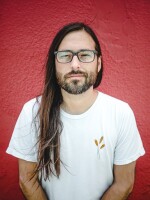STEVE INSKEEP, HOST:
When Native American children read books, they do not often have chances to see people like them. In his debut children's book, called, "Fry Bread," Kevin Noble Maillard tries to change that. He tells a story of food and family. Graham Lee Brewer reports from Norman, Okla.
GRAHAM LEE BREWER, BYLINE: In 2012, as he was expecting his first child, writer and Syracuse Law professor Kevin Noble Maillard was on the hunt for children's books.
KEVIN NOBLE MAILLARD: And I live in a Manhattan apartment so it's just, like, wall-to-wall books, floor to ceiling. And so I wanted him to really love reading as much as I do, too.
BREWER: Maillard is both black and Indigenous. He's a member of the Seminole Nation of Oklahoma, and his wife is Taiwanese. So he wanted to find books that reflected his family.
MAILLARD: I was looking for, like, African American books. I was looking for Asian American books. And then I was looking for Native books. I could find the first two. But then when it came to finding books about Native people, it was so difficult.
BREWER: Maillard had no trouble finding books about Thanksgiving or Pocahontas or Sacagawea.
MAILLARD: Nothing about people alive that were wearing sneakers, that were eating candy, or making cakes with their grandma. So I did one of these naive things where I was like, I think I'll write my own children's book.
BREWER: In "Fry Bread," a Native American family story, Maillard and Caldecott honoree Juana Martinez-Neal tell the story of a modern Native family making fry bread - a fluffy, slightly crunchy and a little greasy bread commonly made in Indigenous communities. Through the story and the book's beautiful pictures, the two also capture the complexity of Native identity.
MAILLARD: 'Cause people can look like white people. They can look like what people think of as Latino. They could look like black people. They could look like Asians, right? So there's no real way that Native people should look.
BREWER: Being Indigenous in America is largely based on tribal citizenship, not simply race. That's something most Americans know little about, says Debbie Reese, a researcher who studies Indigenous representation in children's literature and a member of the Nambe Pueblo. That lack of understanding, she says, starts in our elementary schools.
DEBBIE REESE: Native writers will often say that they are writing the books they wish they had when they were children. That means books that look like they do, where they're walking down the sidewalks or riding their bikes on a reservation.
BREWER: Illustrator Juana Martinez-Neal, who is Peruvian, didn't see herself reflected in a book until she was 18. Martinez-Neal used the end papers of the book to list every federal and state recognized tribe, as well as those currently seeking federal recognition.
JUANA MARTINEZ-NEAL: I think that's so important. It's being seen. It's being recognized. It's - that little, tiny space that each name takes, I think it's so meaningful.
BREWER: Maillard also wants nonnative students to learn from the book, which is why he included an eight-page annotated author's note that can be used as a teaching guide for topics referenced in the text. Things like colonialism, tribal sovereignty and how fry bread is not a traditional food source - instead, one born out of forced removal.
MAILLARD: When I say something about the stolen land, I want kids to be able to ask, well, who stole it, and where did the land come from?
BREWER: Maillard said there is still a lot of work to be done with such a small number of Native writers getting into bigger publishing houses and classrooms. But at least for now, 7-year-old Hampton Maillard can read "Fry Bread" and see characters who look like his family.
HAMPTON: (Reading) Fry bread is everything - round, flat, large, small, north, south, east, west, brown, yellow, black, white. Familiar and for...
MAILLARD: Foreign.
HAMPTON: (Reading) ...Foreign and old and new, we come together.
BREWER: For NPR News, I'm Graham Lee Brewer in Norman, Okla. Transcript provided by NPR, Copyright NPR.







